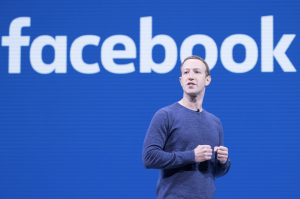
(Photo from Wikimedia Commons is licensed under CC BY 2.0.)
Mark Zuckerberg was able to foresee the potential of the need of an online social media platform in the future and this has made him the social media giant now. The Facebook company is now owning the three most popular social media platforms in the world, Facebook, Instagram and Whatsapp.
The History of Facebook
Facebook was founded by Mark Zuckerberg in 2004. He was still a student studying at Harvard University. Zuckerberg saw the opportunity of an online social media platform to become something bigger on the internet in the future. He then decided to make a new site called “FaceMash” with the purpose of connecting college students together through the website. However, it was shut down by the school within days because it violated the school policy. This experience has inspired Zuckerberg to establish an actual social media platform. The prototype of Facebook was originally created for the Harvard teachers and students to connect with each other using their school email. (McFadden, 2020.)

(photo from Flickr is licensed under CC BY 2.0.)
The Beginning to Success
When Facebook was still the “FaceMash”, it was primarily a site for Harvard students to connect with each other by ranking their classmates’ pictures. It was a hit in the school and attracted more than 20000 views within a night. It failed because the pictures put up on the site were stolen from Harvard University’s internet system and the school could not tolerate this kind of “illegal site”.
The short success of “FaceMash ” provided the idea that socialising can be digitised and datalised. Facebook was created based on these fundamental ideas, a digital social media platform. Facebook was an instant hit in Harvard University, like FaceMash. Harvard University has a population of around 23000 students. Facebook had around 1200 registrations within the first day it was launched and over half of the undergraduate students have a Facebook account after the first month. The site has soon become the most popular social networking tool among the United States college students and later the platform has turned into a hit in the world. The market value of the Facebook company is now estimated to be more than 600 billion US dollars in 2019 and Facebook has more than 2 billion active monthly users on its platform, not including Whatsapp and Instagram. (McFadden, 2020.)
Facebook and The Sharing Economy
Before we talk about the rise of Facebook Company (Facebook), we need to understand the concept of the sharing economy and platform business. Platforms business has become commonalise because of the innovation of the internet and the rise of social media. Platform businesses can be considered as a product of the sharing economics.
According to Professor Jochen Wirtz in the video above, the sharing economy refers to the economic model in which its participants each share their resources with one another. (Wirtz, 2020.) This kind of economy model can mostly be found on different types of platforms and it would eventually form a business ECOsystem. This ECOsystem has forced its participants to produce resources on the platform and at the same time, they would have to engage with the resources offered by the others. Those who refused to participate in this platform Ecosystem would be regarded as the outsiders. (John, 2016) There will only be more and more people joining the system and playing by this rule because it is human nature to want to be included.
The concepts of sharing economy and platform society are well explained by the Facebook business model. Facebook is the platform where its users are the micro-entrepreneurs and the media content produced by the users is the resources. Whoever does not join the platform would be excluded from the ecosystem and they have to register on the platform to be able to reach the resources. (Van, Poell & Waal, 2018.) Most importantly, this creates a phenomenon that people will volunteer to join the platform and offer resources because the purpose of socialisation has been digitised. For example, a person needs to join Facebook to see his friends’ activities on the platforms and he might also want to post about himself to attract other users.
These are indicating that the success of Facebook was benefited by the popularisation of the platform society, where majorly of the human intercourse activities are conducted on and through the platforms, and Facebook’s great development on its closed end platform ecosystem. (Van, Poell & Waal, 2018.)
Where is The Money From?

(Photo from Flickr is licensed under CC BY 2.0.)
It is an interesting topic when it comes to how social media platforms make money through advertising because some might wonder how they are making so much money if they are just a tool for their users to socialise. Advertisers are paying the platform owner to place their ad content as a combination with the user made content. Users are able to use the platform’s publishing services for free because the advert revenue has paid for it. (Mansell & Steinmueller, 2020.)
It is believable that the primary income source of Facebook is through ads sales. Due to the extensive spread of Facebook in the world, the demands on placing advertisements on this platform has been continuously increasing, especially during the pandemic since online commerce has transformed to the mainstream. Facebook has broken down its revenue segment and it stated that advertising has taken 98 percent of the entire proportion. (Johnson, 2021.) In addition, the increase is more obvious after Facebook has soon become the monopoly in the social media platform market by buying Instagram in 2009 and Whatsapp in 2014. These two platforms are the two of the biggest competitors of Facebook. This is demonstrating that Facebook is outplaying other digital platforms and this is illustrating to the companies who are interested in placing advertisements on social media platforms that Facebook has the most resources compared to its competitors. Facebook with the enormous amount of users is like a piece of cake to the advertisers and all of them would like to have a bite.
The Exploitative Nature
(Confessore, 2018.)
The concern that most people have raised on social media platforms is their exploitative natures. Facebook seems to be the most controversial in the topic as it is the most well known social media giant. It is noticed by many of its users that the Facebook company is requesting for more and more access to its users’ personal information using the pretext of improving user experiences after they introduced the algorithm system. (Alpesh, 2021.) Facebook has been exposed by different companies, saying that Facebook has given away huge users’ data and information for other commercial use. A great example is the Cambridge Analytica scandal in which Facebook provided private data that can affect the United States Presidential Election to Cambridge Analytica in 2016. (Confessore, 2018.)
Another exploitative nature of facebook is that it turns its users to free labour. Facebook users are the workers who constantly put their working power into the platform without noticing. They generate and produce the media contents that benefit Facebook because advertisers are placing their ads on these contents and Facebook has full control of this benefit. (Burgess, Marwick & Poell, 2017.)
Conclusion
Facebook is definitely a successful example of platform business just by looking at the achievements and the global connections it now has. However, there are some dark sides of the platform that they might want to clear up in the future, such as increasing transparency within the company and data processing.
References
Alpesh, P. (2021, March 18). Are social media users exploited? 6 ways we can change all that. The SEO Platform. https://theseoplatform.co.uk/blog/are-social-media -users-exploited-6-ways-we-can-change-all-that/
Burgess, J., Marwick, A. E., & Poell, T. (Eds.). (2017). Governance by and through Platforms. The sage handbook of social media. ProQuest Ebook Central, 254-278, https://ebookcentral-proquest-com.ezproxy.library.sydney.edu.au
Confessore, N. (2018, April 4). Cambridge Analytica and Facebook: The Scandal and the Fallout So Far. The New York Times. https://www.nytimes.com/2018/04/04/us/ politics/cambridge-analytica-scandal-fallout.html
John, N. A. (2016). Sharing Economic. The age of sharing. ProQuest Ebook Central, 69-97, https://ebookcentral-proquest-com.ezproxy.library.sydney.edu.au
Johnson, M. (2021, September 27). How Facebook makes money. Investopedia. Https://www.investopedia.com/ask/answers/120114/how-does-facebook-fb-make-mo ney.asp
Mansell, R., & Steinmueller, W. E. (2020). Advanced communication technologies and services: Design configuration and stakeholder interests in Europe. Telematics and Informatics, 14(4), 329–348. https://doi.org/10.1016/S0736-5853(97)00011-7
McFadden, C. (2020, July 7). A brief history of Facebook, its major milestones. Interesting Engineering. https://interestingengineering.com/history-of-facebook
Van Dijck, J., Poell, T., & de Waal, M. (2018). The Platform Society. Oxford University Press, 5-32, https://doi.org/10.1093/oso/9780190889760.001.0001
Wirtz, J. (2020, April 23.) Master Class: Platform Business Model. YouTube. https://www.youtube.com/watch?v=A_G91QynhVk